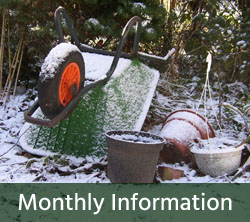
| Weather Averages January 1: High 43, Low 28 January 31: High 42, Low 26 Precipitation: 2.7 inches |
January Garden Calendar
Garden Help Desk
Fairfax County Master Gardeners are prepared to answer your gardening questions at the Help Desk year round. Contact us with gardening questions throughout the season. Contact information and hours of operation are found on the Help Desk page.
Food For Birds
Scientific research has shown that black-oil sunflower seeds attract the most birds. White prove millet is another grain that birds like. You can buy these two seed types in bulk and mix your own bird feed. Grains such as sorghum, wheat, corn, oats and rice rate low in scientific tests compared to black-oil sunflower seeds and white prove millet.
A landscape rich in trees, shrubs and grasses will attract more birds than a lawn-dominated landscape.
Ice Melters
Avoid using ice melters that contain urea. Urea is an important nitrogen-containing ingredient in many fertilizers. But in winter, the soluble nitrogen will run off, polluting local waterways. Manufacturers often claim ice melters containing urea are completely safe for the environment; it’s not true.
Sodium chloride (rock salt) is the cheapest alternative but probably has the most potential to harm plants and pets. It works to 20 degrees F.
Calcium magnesium acetate is safe for plants and pets. However, it is the most expensive option. It only works to 20 degrees F, and it can damage concrete that is less than one year old.
Potassium chloride is the best option for surrounding plants and is reasonably safe for pets. It works to 20 degrees F.
Calcium chloride works fast and melts ice at temperatures as low as -25 degrees F.
Many of the commercial ice melters contain two or more of these ingredients. Read the labels on the bags before you buy, and read them again before you apply. If none of these options appeals to you, try coarse sand to improve traction on icy surfaces.
Trees and Shrubs
Deer protection
Commercial sprays have a good track record in repelling deer. Spray every two to four weeks, rotating among two to three products to keep deer from growing accustomed to the scents. For more information, see our feature on deer.
Snow and ice protection: Snow and ice can damage shrubs with multiple leaders, such as arborvitae and juniper. To prevent branches from bending and breaking, use cloth, nylon or garden twine to tie the trunks together above weak crotches. Remove the ties in spring.
Winter injury prevention
Evergreen shrubs in exposed areas may suffer desiccation from northerly winds or damage from bright afternoon sun on the southwest side of vertical trunks. Prevent both problems by surrounding the entire shrub or part of it with a burlap screen, making sure to leave the top open. Don’t use anti-desiccants, which have been found to be ineffective.
Pruning
The winter pruning season has arrived. Here is a partial list of trees and shrubs that may be pruned in December:
Deciduous trees (engage a pro to prune large ones): Beech, birch, catalpa, crape myrtle, ginkgo, hickory, honey locust, linden, mulberry, black gum, oak, poplar, sourwood, stewartia, sweetgum, sycamore, tuliptree, willow, zelkova.
Evergreen trees: cedar, cypress, fir, hemlock, holly, juniper, Leyland cypress, magnolia, pine, spruce.
Shrubs: abelia, arborvitae, boxwood, butterfly bush, cherry laurel, clethra, cotoneaster, red twig dogwood, gardenia, deciduous holly, juniper, nandina, osmanthus, photinia, mugo pine, privet, smoke tree, sumac, yew.
Prune all dead, damaged or diseased branches any time of the year.
Vegetable Garden
Assuming you completed sanitation and top-dressing tasks in November, there is not much for you to do.
Fruits
Assuming you completed sanitation and rodent protection tasks in November, there is not much for you to do.
Do NOT prune fruit trees now; you will be pruning out the flower buds.
Flowering Annuals, Perennials
Assuming you completed sanitation tasks in November, there is little for you to do. Enjoy the garden seed catalogs that are coming your way.
Houseplants
Watering
Most houseplants should be watered when the surface of the soil feels dry. Add water until it runs out the bottom of the pot. If the soil has pulled away from the pot’s rim, it is much too dry. Soak the pot in a bucket of water to restore the proper moisture.
Light
We won’t have enough natural sunlight to promote plant growth until mid- to late-winter, when the sun is higher in the sky. Until then, use a grow-light to augment sunlight but for no more than 16 hours per day.
Temperature
You might be surprised to find that the temperature on your windowsill is five to 10 degrees colder than near your thermostat. Therefore, if you keep your house at 65 degrees, it is possible that windowsill temperature may be as low as 55 degrees on cold nights. Almost all houseplants originate from the tropics and do not respond well to cold. Nighttime temperatures of 55 degrees may be lethal to some plants such as African violets. Close the window shades at night and make sure your temperature-sensitive plants are on the warm side of the shades.
References
Feeding Wild Birds, VCE Publication 420-006
A Guide to Successful Pruning, Shrub Pruning Calendar, VCE Publication 430-462
A Guide to Successful Pruning, Deciduous Tree Pruning Calendar, VCE Publication 430-460
A Guide to Successful Pruning, Evergreen Tree Pruning Calendar, VCE Publication 430-461
Choose Appropriate Ice Melt Products, Virginia Cooperative Extension 2021
Protecting Trees and Shrubs Against Winter Damage, University of Minnesota Extension